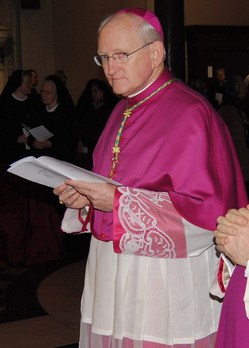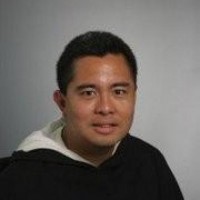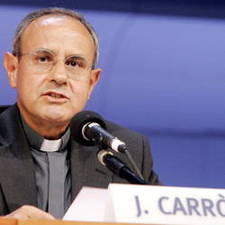The head of the US bishops and archbishop of New York, Timothy Cardinal Dolan, just finished with many others, work at the Synod of Bishops on the New Evangelization in Rome. The Synod called by the Pope is tasked to advise him on questions that concern him in his pastoral leadership of the Church.
New cardinals named by Pope Benedict
In a surprise given to the Church this morning, Pope Benedict announced his intention to name new cardinals in November. One of them is an American, Archbishop James Michael Harvey of Milwaukee who has been serving at the Apostolic Household as its Prefect for the last several years. These new cardinals lifts the numbers eligible to vote in a conclave to 122.
In announcing
the intention to create new cardinals, the Pope said: “The Cardinals have
the task of helping the Successor of Peter in the performance of his ministry
of confirming the brethren in the faith, and that of being the principle and
foundation of unity and communion of the Church … fulfill their ministry in the
service of the Holy See or as fathers and pastors of particular Churches in
various parts of the world.”
The proposed list of new cardinals are
- Archbishop James
Michael Harvey, 63, Prefect of the Pontifical House, who is also appointed
Archpriest of the Basilica of Saint Paul outside the Walls, - His Beatitude Béchara
Boutros Raï, 72, Patriarch of Antioch of the Maronites (Lebanon), - His Beatitude
Baselios Cleemis Thottunkal, 53, Major Archbishop of Trivandrum of the Syro-
Malankara (India), - Archbishop John Olorunfemi Onaiyekan, 68, Archbishop of Abuja
(Nigeria), - Archbishop Ruben Salazar Gómez, 70, Archbishop of Bogota (Colombia),
- Archbishop Luis Antonio Tagle, 55, Archbishop of Manila (Philippines).
The
consistory will take place on November 24.
Human Genomics help us to understand Adam and Eve, Father Nicanor Austriaco says
The Rhode Island Benedictine Portsmouth Abbey School welcomed Dominican Father Nicanor Austriaco to
deliver the Dom Luke Childs Lecture on October 15,
2012. He is an Associate Professor of Biology at Providence College. Father’s address was titled, “What Can Human Genomics Tell Us About Adam and Eve?“
Watch the presentation, it is very good and informative.
The Dom Luke Childs Lecture honors the popular Benedictine monk who taught at Portsmouth and died unexpectedly in 1976. The Lecture topics cover a wide range of intellectual and culture pursuits.
Continue reading Human Genomics help us to understand Adam and Eve, Father Nicanor Austriaco says
Elections 2012 – A Call to Build Anew
As the 2012 elections draw near, we are all encouraged to evaluate where we stand and where we’re heading as a country, since we all belong to one nation that has a common good. Particularly in this moment, when so many of our fellow countrymen suffer from unemployment and economic distress, we know that many long for improvement in their lives. All the same, we don’t believe this election will magically solve the gravest problems that America faces. Legislation, policies, and programs–no matter how perfect–depend on the freedom of flawed human beings like us.
6 monks get their groove
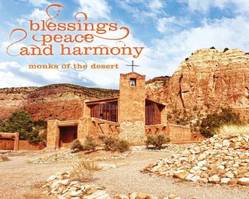 Last week (17 October 2012) six monks from two monasteries, The Abbey of Christ in the Desert (NM) and and Mount Saviour Monastery(NY) met in NYC to have their 3 minutes of fame on the Today Show.
Last week (17 October 2012) six monks from two monasteries, The Abbey of Christ in the Desert (NM) and and Mount Saviour Monastery(NY) met in NYC to have their 3 minutes of fame on the Today Show.
Philosophy and theology are important in the Church’s dialogue with the contemporary world
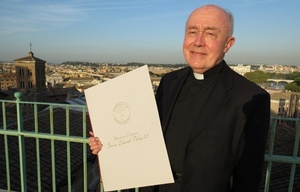 The Ratzinger Prize is getting a whole currency these days: it is the second year that’s been bestowed on worthy scholars. What’s novel of me is that it’s not everyday that you get a prize for serious work from the man the prize is named after, and that he’s the Supreme Pontiff! The 2012 Ratzinger Prize was given to a French philosopher and American theologian on Saturday, October 20, 2012. Pope Benedict said that “Father Daley and Professor Brague are exemplary for the transmission of knowledge that unites science and wisdom, scientific rigor and passion for man, so that man might discover the [true] ‘art of living.'” Chris Altieri has the Vatican Radio report here.
The Ratzinger Prize is getting a whole currency these days: it is the second year that’s been bestowed on worthy scholars. What’s novel of me is that it’s not everyday that you get a prize for serious work from the man the prize is named after, and that he’s the Supreme Pontiff! The 2012 Ratzinger Prize was given to a French philosopher and American theologian on Saturday, October 20, 2012. Pope Benedict said that “Father Daley and Professor Brague are exemplary for the transmission of knowledge that unites science and wisdom, scientific rigor and passion for man, so that man might discover the [true] ‘art of living.'” Chris Altieri has the Vatican Radio report here.Blessed John Paul II
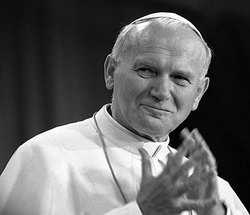 The Holy See has approved today as the liturgical memorial for Blessed Pope John Paul II. The opening collect, below, is the only prayer for the memorial and it does not appear in the Roman Missal.
The Holy See has approved today as the liturgical memorial for Blessed Pope John Paul II. The opening collect, below, is the only prayer for the memorial and it does not appear in the Roman Missal.
blessed John Paul the Second should preside as Pope over your universal Church,
grant, we pray, that instructed by his teaching, we may open our hearts to the
saving grace of Christ, the sole Redeemer of mankind.
Saint Kateri Tekakwitha
The Church, through the ministry of Pope Benedict XVI, canonized the first Native American woman today. The Church made an infallible statement in proclaiming before the world that Kateri Tekakwitha (1656-1677), from the Mohawk Indian tribe,
is in fact with God, a saint. Also canonized was Marianne Cope.
Msgr. Lorenzo Albacete
Winters writes, “Msgr. Albacete introduced me to many of the people I
now consider dear friends. Of course, there are the good people of Communione e
Liberazione, who have a charism for friendship.” Yes. He did. Thanks be to God for Lorenzo.
Julián Carrón speaks st the Synod on the New Evangelization
Those who hold the rank of Ordinary members of the Synod Bishops are able to make a public contribution at the Synod. On Saturday, October 13, 2012, the President of the Fraternity of Communion and Liberation, Father Julián Carrón, made his presentation to the assembled Synod members, and the Pope. Pay close attention to exactly what Father Carrón said,
We can no longer “think of the faith as a self-evident presupposition for life in society”. In fact, “not only can this presupposition no longer be taken for granted, but it is often openly denied” (Porta Fidei, 2).
While reading the Instrumentum laboris (142), I was shocked by this observation: “a concern on the scarcity of initial proclamation taking place everyday”. All the efforts made until today are having trouble generating newness of life that will arouse curiosity on how the baptized live. How can the fracture between faith and life be overcome, a fracture that makes it harder for faith to be found in a reasonable way, and therefore, attractive? Without rediscovering and welcoming the precious gift that is faith, new evangelization risks being diminished to being a question for experts.
To incite this interest, we have an ally in the heart of man from any culture and condition. We know that the heart of man is made for the infinite. Awaiting its achievement remains in him. Because there is “no false infinite that can satisfy him”. “What, then, will anyone gain by winning the whole world and forfeiting his life?” (Mt 16:26).
A doctrine, a group of rules, an organization cannot answer this expectation, only an event. As Fr. Giussani said during the 1987 Synod, “What is lacking is not as much the verbal or cultural repetition of the proclamation. Today’s man perhaps awaits subconsciously the experience of the encounter with persons for whom the fact of Christ is such a present reality that it has changed their lives“. A place where everyone is invited to verify what the first verified on the banks of the river Jordan: “Come and see”, because “a faith that cannot be evidentiated and found in present experience, confirmed by it, that is not useful in answering its needs, will not be a faith capable of resisting in a world where everything, absolutely everything, says the opposite”.
